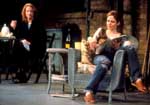
Manhattan Theater Club does it again! David Auburn’s Proof is what Copenhagen ought to be: a play about scientists whose science matters less than their humanity. Here, those of us who want their dramatic characters to be real people need not feel excluded. Robert, a world-famous mathematician who went crazy; Catherine, his mathematically brilliant but too-depressed-to-work daughter; Hal, a young math teacher going through Robert’s hundred-plus confused notebooks; and Claire, Robert’s older daughter and a successful actuary, are above all fascinating individuals. Robert isn’t any less human even for being, through most of the play, dead. All four – whether loving, hating, encouraging or impeding one another – are intensely alive, complex, funny, human.
The very first scene in Proof is masterly: a birthday dialogue between father and daughter, in which Catherine, alive, is barely living, and her celebrated father is sparklingly trying to rouse her into action although he is (I hate to give it away but must) dead – Catherine’s fantasy. Yet this mysterious, droll, and electrifying scene is really exposition in disguise: something generally a bore, but here so splendidly reconceived as to fascinate – as indeed all of Proof does.
So here we have Robert, the near-genius mathematician who went mad and eventually died, and Catherine, who gave up a potentially great mathematical career to look after him and, in the process, let herself run down, perhaps irreversibly. Here, too, is Claire, the narrowly practical daughter, who wants to save Catherine from what may be incipient madness by dragging her from Chicago to New York and supervising her life – benignly as she sees it, but horribly as Catherine does. And here is Hal, revering Robert’s work and secretly in love with Catherine, bumbling and bungling everything. Out of this curious quartet, Auburn creates emotionally and intellectually enveloping music.
The performances are perfect: Larry Bryggman’s lovable but exasperating Robert; Johanna Day’s officious yet well-meaning Claire; Ben Shenkman’s clumsy but gradually maturing Hal. As for Mary-Louise Parker, her Catherine is a performance of genius. Is there another young actress as manifold, incisive, sexy, and effortlessly overpowering? Add to this Daniel Sullivan’s superb direction and the classy production values (by John Lee Beatty, Jess Goldstein, and Pat Collins), and it all spells J-O-Y. Instead of taking up more time reading, you are urged to run and get your tickets immediately.